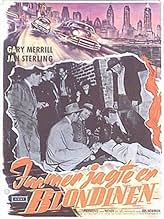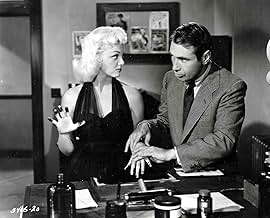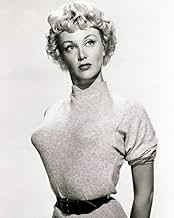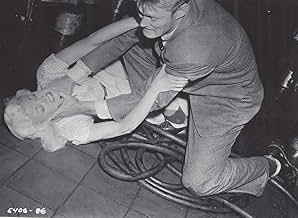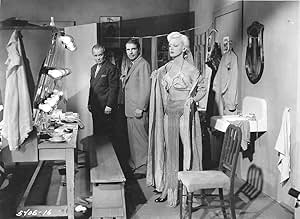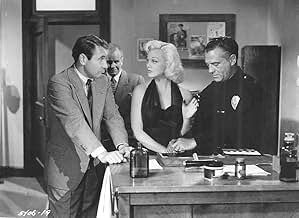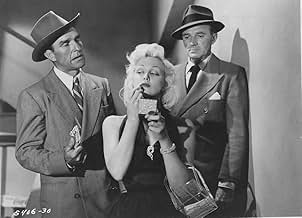Police procedural film about a police captain assigned to take over a demoralized precinct and turn it around by settling all the unsolved cases, as well as some new tough ones.Police procedural film about a police captain assigned to take over a demoralized precinct and turn it around by settling all the unsolved cases, as well as some new tough ones.Police procedural film about a police captain assigned to take over a demoralized precinct and turn it around by settling all the unsolved cases, as well as some new tough ones.
Patrick Waltz
- Det. Strauss
- (as Pat Waltz)
George D. Wallace
- Det. O'Neill
- (as George Wallace)
Featured reviews
Gary Merrill is Danforth, a cop turned attorney who is roped into running a tough precinct in "The Human Jungle" from 1954, directed by Joseph M. Newman, also starring Jan Sterling and Chuck Conners.
The precinct known as The Heights is in bad shape: juvenile delinquency, petty crimes, graft, the unsolved murder of a strip-tease dancer, and no effort to clear cold cases.
The department has become lazy. Danforth is asked to take over rather than accepting a job in a law firm. He makes changes that are not popular, putting cops back on beats so they're more visible, and taking a tougher stance with criminals.
In order to solve the murder of Lillian Dean, a prostitute, he questions one of her gentleman callers, Swados (Connors) who works for a petty mobster.
He is alibied by Mary Abbot (Sterling) who works at a crime-ridden club, The Hut. Danforth doesn't believe the alibi. He puts Mary in danger by intimating to Swados that she talked. Can he keep her alive?
Meanwhile, some teens picked up for minor theft claim police brutality- they were actually beat up by the big boss so they could make the claim. And an officer actually shoots an innocent citizen. If Danforth can't get Swados or Mary to talk about what's going on, he's in trouble.
Good B movie, with Jan Sterling giving an excellent performance as a hardboiled stripper. Merrill is an effective tough guy.
Fairly routine, but the performances liven it up. The end takes place in a Pabst Blue Ribbon factory as Mary runs from Swados. It's great.
The precinct known as The Heights is in bad shape: juvenile delinquency, petty crimes, graft, the unsolved murder of a strip-tease dancer, and no effort to clear cold cases.
The department has become lazy. Danforth is asked to take over rather than accepting a job in a law firm. He makes changes that are not popular, putting cops back on beats so they're more visible, and taking a tougher stance with criminals.
In order to solve the murder of Lillian Dean, a prostitute, he questions one of her gentleman callers, Swados (Connors) who works for a petty mobster.
He is alibied by Mary Abbot (Sterling) who works at a crime-ridden club, The Hut. Danforth doesn't believe the alibi. He puts Mary in danger by intimating to Swados that she talked. Can he keep her alive?
Meanwhile, some teens picked up for minor theft claim police brutality- they were actually beat up by the big boss so they could make the claim. And an officer actually shoots an innocent citizen. If Danforth can't get Swados or Mary to talk about what's going on, he's in trouble.
Good B movie, with Jan Sterling giving an excellent performance as a hardboiled stripper. Merrill is an effective tough guy.
Fairly routine, but the performances liven it up. The end takes place in a Pabst Blue Ribbon factory as Mary runs from Swados. It's great.
"The Human Jungle" (1954), directed by Joseph M. Newman, who would go on to make the classic science fiction film "This Island Earth" (1955) is film noir starring Gary Merrill, Jan Sterling and Regis Toomey.
The screenplay is nothing out of the ordinary: a cop turned lawyer (Gary Merrill) is offered to become chief of police in a hard inner city neighbourhood and he attempts to crack down on a large mobster (Florenz Ames).
After achieving stardom in films like "All About Eve" (1950), Gary Merrill's film career seemed to slowly die during the middle of the fifties in movies like this. Having seen him quality productions, one blames the script rather than he for the arrogant, bull-headed and plain unlikable persona he has here. In fact, by the end of it, you want him to die. The limp direction does the motion picture no favours and only Jan Sterling, Florenz Ames and Paula Raymond come out of the acting department with much dignity. It's a shame really that Ellis W. Carter, the cinematographer, and Hans J. Salter's music are found too far below what their talents deserve and manage to make this banal and film noir just about watchable.
The screenplay is nothing out of the ordinary: a cop turned lawyer (Gary Merrill) is offered to become chief of police in a hard inner city neighbourhood and he attempts to crack down on a large mobster (Florenz Ames).
After achieving stardom in films like "All About Eve" (1950), Gary Merrill's film career seemed to slowly die during the middle of the fifties in movies like this. Having seen him quality productions, one blames the script rather than he for the arrogant, bull-headed and plain unlikable persona he has here. In fact, by the end of it, you want him to die. The limp direction does the motion picture no favours and only Jan Sterling, Florenz Ames and Paula Raymond come out of the acting department with much dignity. It's a shame really that Ellis W. Carter, the cinematographer, and Hans J. Salter's music are found too far below what their talents deserve and manage to make this banal and film noir just about watchable.
When he is invited down to visit friend Police Chief Abe Rowan, Captain John Danforth finds a precinct full of lazy and unmotivated cops surrounded by a district overrun by juvenile delinquency and crime most notably a high profile murder that has just occurred. Danforth challenges Rowan and as a result Rowan throws the job back at him and Danfoth finds himself in temporary charge and determined to turn the precinct around. Breaking the news to his wife is only the first of many challenges to confront Danforth as he tackles his own men, small crime, organised hoods and internal red tape.
As the sagely Theo has already commented, this is a film that surprisingly still has a lot of relevance in the UK at the moment, what with police over stretched, "justice" being seen as something that doesn't exist in the real world anymore and police seemingly hampered by red tape while their standing within the community drops away to nothing. So with that background this film is instantly interesting after the ten-minute set up sees Danforth facing similar challenges and taking them on. However despite this unintentional realism, the film is fairly straightforward without any great imagination but it does still do enough to be gritty and interesting on its own terms. Although not morally complex enough to really be classed as a noir, it is still gritty as a story and produce the usual hardnosed, tough-talking delivery. The story is reasonable enough although the simplistic view of one officer turning around an entire area is perhaps hard to swallow whenever the daily news here suggests that the system can defeat any enthusiastic officer. In that regard, Danforth will be seen as a rallying cry to the Right (he even dismisses the accidental shooting of a pedestrian by one of his officers as being just part of a war), but his policies will produce very little empathy from the more liberal sections of the audience.
The cast can't really do much with the material and deliver fairly average performances across the board. Merrill barks around the screen with a constant righteous indignation and hardline approach that didn't totally convince me the film would have been more interesting if it had really delved into his character in the way that it kept suggesting it would but never really did. Sterling is unconvincing and quite unnecessary like her emotional observations on Danforth are designed to replace the development of him as a character, and that the director just wanted us to know the man in as simple a way as possible. Waltz is OK but Meyer is fairly stiff in his scenes and is too clearly an apologetic soft touch.
Overall this is an OK film with gritty material but far too straightforward a plot and foundation to really make for an interesting, complex story with no easy answers. Instead it gradually falls into a standard crime thriller plot and the manipulative and hardline character of Danforth is just accepted without much thought or development. Considering how relevant it still is today it is a real shame it didn't do better but as it is it's a standard crime affair with nothing to really make it stand out from a crowded genre.
As the sagely Theo has already commented, this is a film that surprisingly still has a lot of relevance in the UK at the moment, what with police over stretched, "justice" being seen as something that doesn't exist in the real world anymore and police seemingly hampered by red tape while their standing within the community drops away to nothing. So with that background this film is instantly interesting after the ten-minute set up sees Danforth facing similar challenges and taking them on. However despite this unintentional realism, the film is fairly straightforward without any great imagination but it does still do enough to be gritty and interesting on its own terms. Although not morally complex enough to really be classed as a noir, it is still gritty as a story and produce the usual hardnosed, tough-talking delivery. The story is reasonable enough although the simplistic view of one officer turning around an entire area is perhaps hard to swallow whenever the daily news here suggests that the system can defeat any enthusiastic officer. In that regard, Danforth will be seen as a rallying cry to the Right (he even dismisses the accidental shooting of a pedestrian by one of his officers as being just part of a war), but his policies will produce very little empathy from the more liberal sections of the audience.
The cast can't really do much with the material and deliver fairly average performances across the board. Merrill barks around the screen with a constant righteous indignation and hardline approach that didn't totally convince me the film would have been more interesting if it had really delved into his character in the way that it kept suggesting it would but never really did. Sterling is unconvincing and quite unnecessary like her emotional observations on Danforth are designed to replace the development of him as a character, and that the director just wanted us to know the man in as simple a way as possible. Waltz is OK but Meyer is fairly stiff in his scenes and is too clearly an apologetic soft touch.
Overall this is an OK film with gritty material but far too straightforward a plot and foundation to really make for an interesting, complex story with no easy answers. Instead it gradually falls into a standard crime thriller plot and the manipulative and hardline character of Danforth is just accepted without much thought or development. Considering how relevant it still is today it is a real shame it didn't do better but as it is it's a standard crime affair with nothing to really make it stand out from a crowded genre.
Gary Merrill is the leader in charge of the operation, coming to a station that has let everything down in apathetic hopelessness, in which Merrill stirs everyone up and gets everything done at once. The result is naturally some awful mistakes, which they just bypass and carry on head on with full speed, ready to drive over anyone in the way, risking human lives when necessary. The pace is hot, the action is constantly bolting and getting worse in the end, the final chase is the highlight of the film, and the two ladies don't get much chance of getting heard or noticed in the fury of the manhunts. Gary Merrill is always a guarantee for a film worth watching, but this noir is particularly dark in every way, maybe especially cinematographically. It is a wild rush all the way, you have to hold on to your hat, and when it is all over you don't remember much of what really happened and still try to get some hang of the mess of intrigues. It is a film for noir fans of a more exclusive category, preferring fast action to dialog and characters, and you never get an idea of where all this happened - unless it was just any city.
The grade B but very efficient crime film explores the daily life in a police station, daily procedural work for cops. You can think about FUZZ or CHOIRBOYS made in the seventies, or more simple you can think about the Ed McBain's or Joseph Wambaugh's novels. It is even more interesting than focusing on only one particular case. Wambaugh was more beat cops oriented and McBain investigating cops, detectives...Jan Sterling shines in this movie and the other supporting characters besides she and Gary Merrill also contribute to this effective B crime film.
Did you know
- TriviaWhen Det. Lannigan is first put on the beat as a patrolman, he passes a poster for the movie Paris Model (1953). William H. O'Brien, who plays the bartender at 'The Hut' in this film, portrayed a waiter in that movie.
- Quotes
Mary Abbott: [talking to Danforth backstage at 'The Hut'] And don't go breakin' my heart about those old guys. Did ya ever see one of 'em in action? Like tryin' to argue with a diesel engine.
- ConnectionsReferenced in Broadway by Light (1958)
- How long is The Human Jungle?Powered by Alexa
Details
- Release date
- Country of origin
- Official sites
- Language
- Also known as
- The Police Story
- Filming locations
- Production company
- See more company credits at IMDbPro
- Runtime
- 1h 22m(82 min)
- Color
- Aspect ratio
- 1.85 : 1
Contribute to this page
Suggest an edit or add missing content

